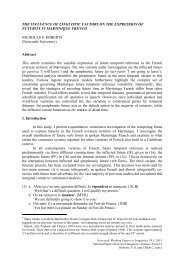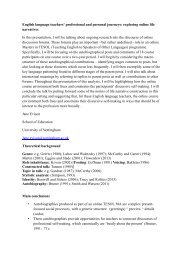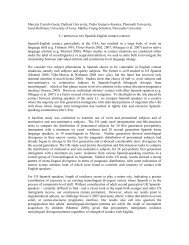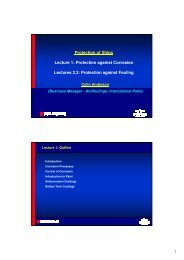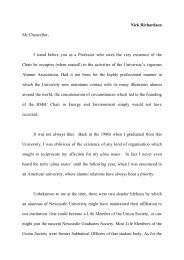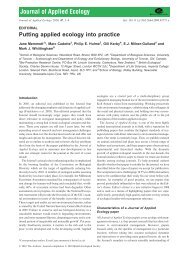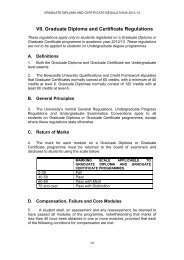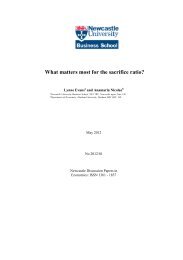The decline of the British tyre industry - Newcastle University
The decline of the British tyre industry - Newcastle University
The decline of the British tyre industry - Newcastle University
Create successful ePaper yourself
Turn your PDF publications into a flip-book with our unique Google optimized e-Paper software.
1973 Britain joined <strong>the</strong> EEC and in July 1977 duty on Community imports was removed, which allowed <strong>the</strong><br />
continental producers to exploit <strong>the</strong> <strong>British</strong> market. <strong>The</strong> elimination <strong>of</strong> tariffs was not <strong>the</strong> sole cause <strong>of</strong> <strong>the</strong><br />
increase in imports. <strong>The</strong> <strong>British</strong> car <strong>industry</strong> had a legacy <strong>of</strong> uncompetitive plant and an ageing model range<br />
due to <strong>the</strong> lack <strong>of</strong> investment in <strong>the</strong> 1960s. 37 <strong>The</strong> oil crisis caused a shift in demand away from large-engine<br />
cars and by 1974 cars with an engine capacity <strong>of</strong> less than 1200cc accounted for 25 per cent <strong>of</strong> total sales. 38<br />
<strong>The</strong> foreign assemblers were able to meet this demand whereas <strong>the</strong> <strong>British</strong> producers were unable to respond.<br />
As a consequence, original equipment <strong>tyre</strong> production fell from a peak <strong>of</strong> nearly 11 million car <strong>tyre</strong>s in 1972<br />
to under 6 million in 1975. 39<br />
<strong>The</strong> second strategic issue facing <strong>the</strong> <strong>tyre</strong> manufacturers was <strong>the</strong> shift away from <strong>the</strong> crossply to <strong>the</strong> longer<br />
wearing radial <strong>tyre</strong>. <strong>The</strong> spread <strong>of</strong> <strong>the</strong> fabric belted radial in <strong>the</strong> <strong>British</strong> original equipment and replacement<br />
markets coincided with <strong>the</strong> oil crisis. <strong>The</strong> cutback in vehicle mileage combined with <strong>the</strong> longevity <strong>of</strong> <strong>the</strong><br />
radial caused <strong>the</strong> replacement market to dramatically shrink in size. <strong>The</strong> <strong>industry</strong> was fur<strong>the</strong>r depressed by<br />
<strong>the</strong> adoption <strong>of</strong> <strong>the</strong> steel radial in 1975 which captured 38 per cent and 25 per cent respectively <strong>of</strong> <strong>the</strong> original<br />
equipment and replacement markets. 40 <strong>The</strong> feasible life <strong>of</strong> a crossply <strong>tyre</strong> was 18,000 miles compared to<br />
28,000 miles for a fabric radial and 40,000 miles for a steel radial. 41 As a result, car <strong>tyre</strong> production slumped<br />
from 26.64 million units in 1970 to 22.22 million in 1975. 42<br />
In 1977 <strong>the</strong> Rubber Processing SWP set itself <strong>the</strong> task <strong>of</strong> arresting and reversing <strong>the</strong> <strong>decline</strong> <strong>of</strong> <strong>the</strong> <strong>British</strong><br />
<strong>tyre</strong> sector. <strong>The</strong> SWP identified two key policies: first, to improve domestic production efficiency; second, to<br />
increase <strong>the</strong> producers’ sales and marketing efforts. <strong>The</strong> SWP’s guiding principle was that improving<br />
performance should be underpinned by security <strong>of</strong> employment, and that increases in productivity should be<br />
determined by increased output and a higher world market share. 43<br />
<strong>The</strong> NEDO quantified <strong>the</strong> target output level from market forecasts and productivity data provided in<br />
confidence by individual companies. <strong>The</strong> information suggested that <strong>British</strong> productivity (measured by



